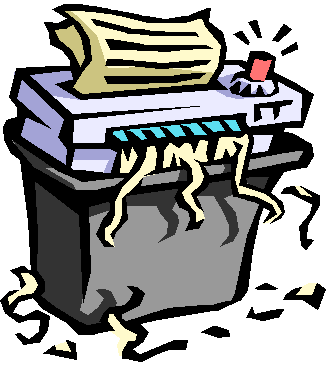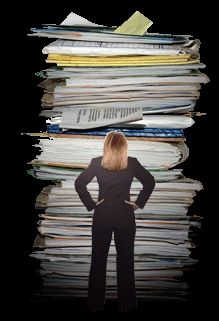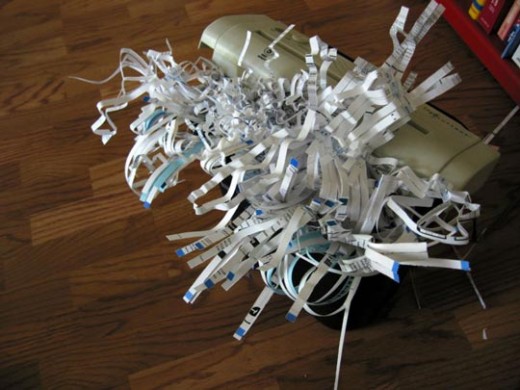Do I need to keep This?

By Joni Douglas
Now that tax season is done for this year, it is time for me to once again, file away all the receipts, paid bills, and also bank and income statements. I keep all this paperwork in a filing cabinet. This filing cabinet is now home to; I don’t even know many years worth of paperwork. I’m thinking it’s time to clean it out.
If you’re like most people you have year’s worth of papers that you simply don’t need anymore. I swear I have files with papers in them that are from 20 years ago. In fact, I bet if I looked hard enough I could find bank registers from 1978. I guess I’m just one of those people afraid to throw paperwork away, you know the excuse; I might need it someday. I’m not sure I will ever need a bank register from 1978, but the thought has been pounded into my brain not to throw important papers away.

Still undecided as to how important it is to keep these old documents, I did some checking.
So, I thought I would share with you what I learned about which documents are important to keep and which ones you can throw away.
My desk has these not–so–neat piles of papers that need to be filed.
Two filing cabinets are full of papers in my office. I have boxes in my basement, stuffed with old bank statements, tax returns and paid bills.
I kid you not; these boxes have moved with me three times and have remained untouched for the past eight years. So, I finally decided I had to do something with them.

The first thing I did was purchase a shredder, the kind with diamond cuts, so the little pieces of paper can not get taped back together. Although, to my thinking, a criminal would have to be really desperate to wade through bags and bags of trash, looking for these little strips of paper in hopes of finding a few strands that match and then…..just maybe, there might be an account number printed on it somewhere. I know, we have all heard those horror stories. We’re told to shred all our mail and any papers that we receive that have our name and address printed on them, instead of just throwing them away. Until now, I never really paid much attention to it. But as I’m sitting here, ready to throw away documents that have my bank account numbers, credit card numbers and checking account information all over them, I’m thinking that I’d better use that shredder with the added diamond cuts.

Now for the paperwork –
What to Keep
I’ve heard it said; keep your tax returns forever. Okay, I can do that. If I’m wrong, somebody, please leave me a comment. The IRS can audit you at any time for the previous three years, so I guess it’s safe to assume that supporting paperwork for tax returns older than three years can be tossed. That also means that paperwork included in the last three years of returns need to be kept, that includes investment statements and letters from charities.

Investment papers should also be kept. Once you’ve received a year-end statement, there is no need to keep the monthly fund reports. The initial records that show the purchase price of any stocks or mutual funds should be kept within your investment folder. You may need the information on these records when you decide to sell.
Mortgage information should be kept as long as you keep the house. Include with those papers, any receipts for all of the improvements you have made on the house. These records not only prove the added value to your home but they may also be used on future tax returns, after selling your house.
IRAs and 401(k)s generate paperwork that you need to hold onto, especially if you’ve made nondeductible contributions. It’s easy to make the mistake of overpaying the taxes when you withdraw the money so keep any and all forms on which you reported nondeductible contributions to traditional IRAs.
What you don’t have to Keep
Here is what I really needed to find out. You know all those ATM receipts? You can throw them away. Bank withdrawal and deposit slips, credit card receipts, those little receipts from the gas station can all be thrown away. In fact, once you’ve checked those receipts against your monthly statements, they can be thrown out right away.
Pay stubs, I have always been told to keep pay stubs. I don’t remember who told me, but I have pay stubs from jobs that I don’t even remember. Well, now I know I can toss those too. One word of caution about your pay stubs, you should keep your current pay stubs until you receive the form W-2 to reconcile your wages for the past year. Then it is off to the shredder for them too. Social Security information may be printed on them so it is very important to shred those as well.

Don’t be shocked, but, in one box, I found seven years worth of bank statements from the mid- 90s. I don’t even use that bank anymore; that account was closed more than five years ago. My poor shredder is really working overtime this afternoon.
Once you’ve reconciled your checkbook to match your bank statements, you really don’t have to keep bank statements any longer. I, however, plan to keep mine at least for the calendar year. Maybe it’s me; I just can’t give up the hard copy yet. I guess old habits die hard. Online banking can provide those statements very quickly, which really reduces the need for these paper statements to be kept.
That leaves my credit card bills and utility bills. At the end of each year I accumulate all the bills, sort through them by date, staple them together and then just put them in a big envelope, marked with the year and, yep, you guessed it; I put them in a box. What a fun job that is, especially if my filing wasn’t up to date. Once they’re in the box, I never have to look at them again.
So, here I am with all of these boxes, full of electric bills for the last umpteen years. What I have found, and it seems to make sense, is to keep these bills for at least the calendar year to provide backup in case any of them can be used for tax purposes. If not, I’ll toss him. If they are used for tax purposes, then they should be kept for three years with the tax forms.

Well I don’t know about you but I have enough confetti flying out of my shredder to safely ship the infamous leg lamp. I hope this helps. It sure helped me. I have all this room in my filing cabinet. Of course, I’ll probably just end up filling it up with other junk papers.
Better still, I have all this room in my basement, probably not for very long though. I think there’s a standing rule around here that we aren’t allowed to have any open spaces in the storage area of our basement. I wonder if there’s a rule book I should check, just to be sure.









